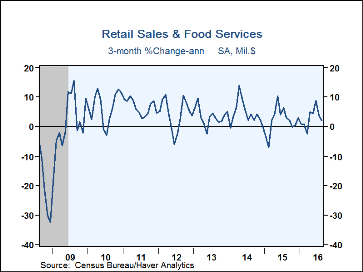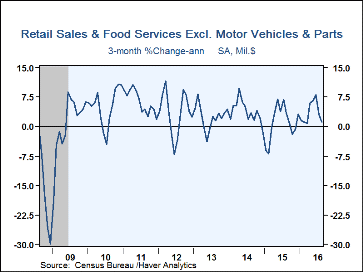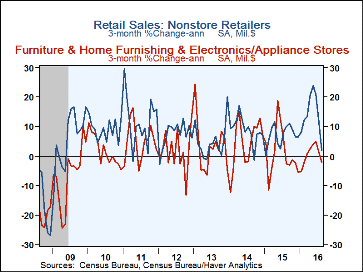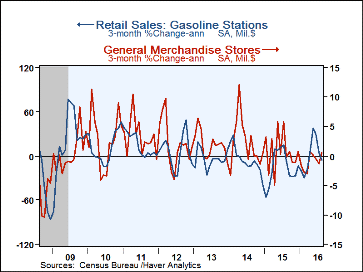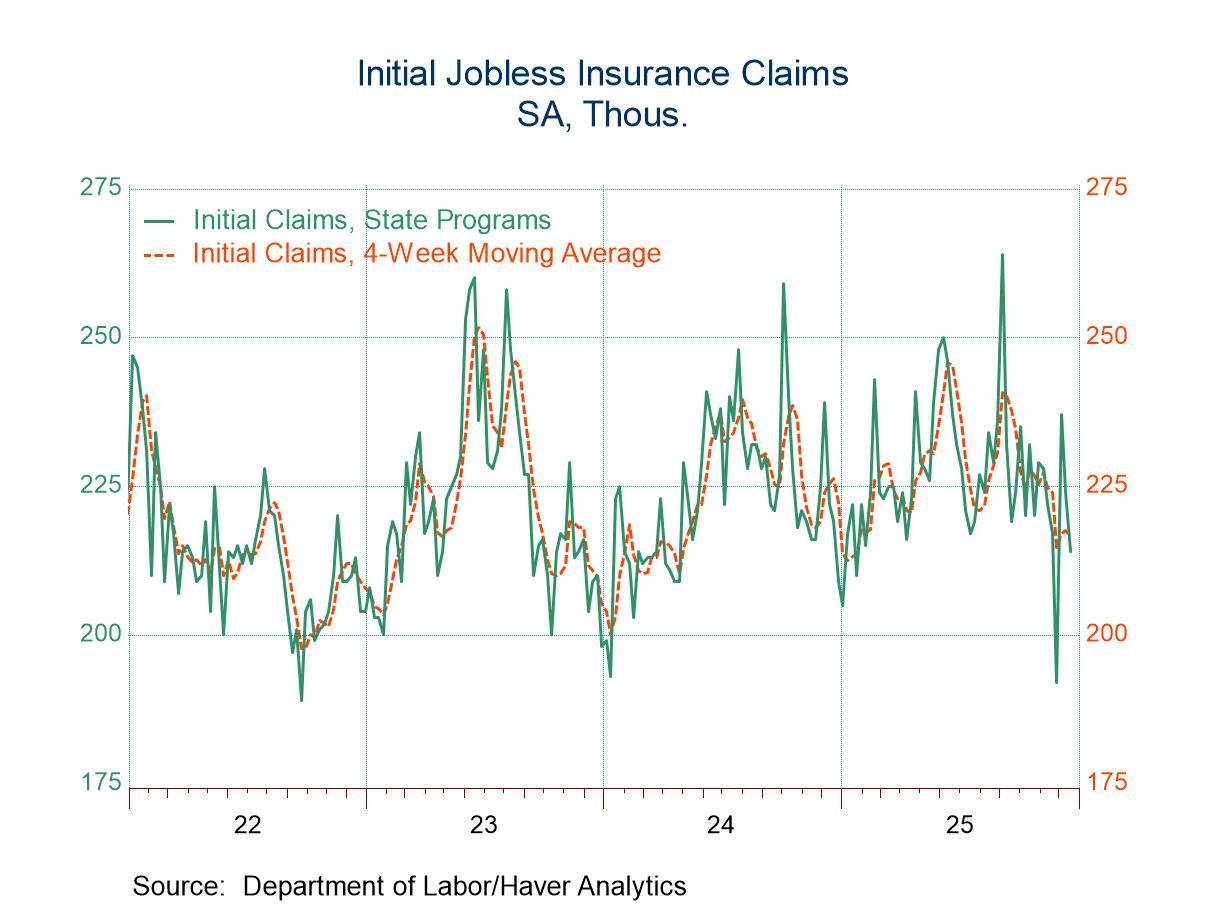 Global| Sep 15 2016
Global| Sep 15 2016U.S. Retail Sales Decline Is Led by Autos
by:Tom Moeller
|in:Economy in Brief
Summary
Total retail sales & spending at restaurants fell 0.3% during August (+1.9% y/y) following a 0.1% July uptick, revised from little change. Expectations had been for a 0.1% slip in the Action Economics Forecast Survey. Auto sales led [...]
Total retail sales & spending at restaurants fell 0.3% during August (+1.9% y/y) following a 0.1% July uptick, revised from little change. Expectations had been for a 0.1% slip in the Action Economics Forecast Survey.
Auto sales led the decline in spending last month with a 0.9% drop (+1.4% y/y), following a 1.7% increase. The fall compared to a 5.0% decline in unit vehicle sales. Overall retail sales excluding autos eased 0.1% (+2.0% y/y) after a 0.4% decline. A 0.2% gain had been expected.
Lower gasoline prices held back the rise in total retail sales for a second straight month. Gasoline service station sales fell 0.8% (-9.5% y/y), and added to a 2.6% July drop. A 1.4% decline (+2.2% y/y) in purchases of building materials & garden equipment also damped total spending. Excluding these categories, and autos as well, retail sales eased 0.1% (+2.8% y/y) for a second straight month.
Retail sales declined 0.5% last month (+1.4% y/y) after a 0.1% gain. Sales excluding autos declined 0.3% (+1.4% y/y) following a 0.4% fall. Nonstore retail outlets posted a 0.3% decline in sales (+10.9% y/y) after a 0.7% increase. Furniture & home furnishings store sales were off 0.7% (+1.6% y/y) following a 1.1% decline. Electronics & appliance store sales improved, however, by 0.1% (-3.1% y/y) after a 0.1% dip. Apparel store sales increased 0.7% (-0.3% y/y) and made up the prior month's decline, while general merchandise store sales remained unchanged (-0.7% y/y) after easing 0.1%. Sporting goods store sales declined 1.4% (+1.1% y/y) after a 2.1% decline. Restaurant & drinking establishment sales increased 0.9% (+5.8% y/y), the strongest rise in six months.
In the non-discretionary spending category, health & personal care sore sales fell 0.1% (7.8% y/y) following a 0.5% increase. Food & beverage store sales gained 0.3% (1.7% y/y) after a 0.4% decline.
Atlanta Fed Economists Probe Mysteries of Chinese Economy from the Federal Reserve Bank of Atlanta is available here.
The retail sales figures are available in Haver's USECON database. The Action Economics figures are in the AS1REPNA database.
| Retail Spending (%) | Aug | Jul | Jun | Aug Y/Y | 2015 | 2014 | 2013 |
|---|---|---|---|---|---|---|---|
| Total Retail Sales & Food Services | -0.3 | 0.1 | 0.7 | 1.9 | 2.3 | 4.1 | 3.8 |
| Excluding Autos | -0.1 | -0.4 | 0.8 | 2.0 | 1.2 | 3.6 | 2.7 |
| Non-Auto Less Gasoline, Building Supplies & Food Services (Control Group) | -0.1 | -0.1 | 0.3 | 2.8 | 3.3 | 4.0 | 2.9 |
| Retail Sales | -0.5 | 0.1 | 0.8 | 1.4 | 1.6 | 3.9 | 3.8 |
| Motor Vehicle & Parts | -0.9 | 1.7 | 0.5 | 1.4 | 6.5 | 6.4 | 8.3 |
| Retail Less Autos | -0.3 | -0.4 | 0.8 | 1.4 | 0.2 | 3.2 | 2.6 |
| Gasoline Stations | -0.8 | -2.6 | 2.2 | -9.5 | -19.4 | -2.4 | -1.2 |
| Food Service & Drinking Places Sales | 0.9 | -0.0 | 0.5 | 5.8 | 8.0 | 6.1 | 3.7 |
Tom Moeller
AuthorMore in Author Profile »Prior to joining Haver Analytics in 2000, Mr. Moeller worked as the Economist at Chancellor Capital Management from 1985 to 1999. There, he developed comprehensive economic forecasts and interpreted economic data for equity and fixed income portfolio managers. Also at Chancellor, Mr. Moeller worked as an equity analyst and was responsible for researching and rating companies in the economically sensitive automobile and housing industries for investment in Chancellor’s equity portfolio. Prior to joining Chancellor, Mr. Moeller was an Economist at Citibank from 1979 to 1984. He also analyzed pricing behavior in the metals industry for the Council on Wage and Price Stability in Washington, D.C. In 1999, Mr. Moeller received the award for most accurate forecast from the Forecasters' Club of New York. From 1990 to 1992 he was President of the New York Association for Business Economists. Mr. Moeller earned an M.B.A. in Finance from Fordham University, where he graduated in 1987. He holds a Bachelor of Arts in Economics from George Washington University.


